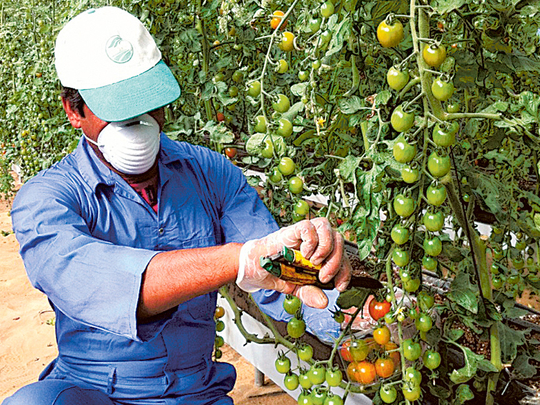
Abu Dhabi: Growing awareness about the dangers of pesticides and herbicides is beginning to reflect in agricultural practices throughout the UAE thanks to a new push by the government to give farming a modern makeover.
Many farms have not put in place signs that ensure the safety of farm hands and visitors alike when the use of chemicals is necessitated.
One farm visited by Gulf News had several measures in place to effectively cut risks posed by hazardous materials.
Al Arabi Hassan Al Mansouri, 51, who owns a date palm plantation said: “If you visit my farm now, you will often find red flags, which were not there two years ago.”
The red flags are put in place after pesticides have been sprayed so that workers and visitors know to stay away. “I did not know earlier that we have to keep away from an area where pesticide is sprayed in the farm for at least six hours. Now I record the time of pesticide use, its amount and put red flags and remove them after the stipulated time,” Al Mansouri said.
He implemented the safe practices after registering his farm for a certification given by Global GAP (Good Agricultural Practices), an international private sector body that sets voluntary standards for the certification of the agricultural production process.
Al Mansouri was one among the 110 farmers who were honoured by government officials at the Global GAP Summit in Abu Dhabi after they received the certification under an initiative of the Abu Dhabi Farmers Service Centre (ADFSC) that oversees the agriculture sector in the emirate.
“I will keep this appreciation certificate at my Majlis. I value it a lot. I feel I have been working hard and now I have started getting rewards,” Al Mansouri, who has been into farming since 1991, told Gulf News on the sidelines of the summit.
Al Mansouri owns a 4,000 square metre date palm farm in Liwa in the Western Region of Abu Dhabi, which gives him 18 to 20 tonnes of annual yield from more than a thousand date palms. He earns Dh120,000 per year and expects to improve the income considerably with the modern practices.
An Egyptian manager and six workers from Pakistan and Bangladesh help him run the farm.
After attending the training on safe practices under the certification scheme, Al Mansouri said, his workers stopped throwing away empty pesticide bottles. “They made holes in the bottles and disposed them of safely to ensure that empty pesticide bottles will not be reused at all,” he said.
Amer Al Khateri, Farm Assurance and Good Agricultural Practices Officer at Abu Dhabi Farmers Service Centre (ADFSC), told Gulf News that reusing empty pesticide bottles could cause poisoning. “We are giving designated bags to workers to dispose of empty bottles. Earlier they used to throw it away in the farm itself.”
All farms have exhibited a list of phone numbers to be contacted in case of an emergency.
Al Mansouri said the workers were also using protective clothes and other safety gear while handling pesticides.
“We have put hazardous signs in front of the room that keeps pesticides. Earlier everything used for farming was kept together, but not anymore.”
Pesticides and chemical fertilisers are strictly kept separately with enough ventilation. Fire extinguishers have been installed after training the workers on their operation. “Earlier I haven’t seen fire extinguishers in any farm,” Al Mansouri said.
The records of use of pesticides and other chemicals are inspected by the officials from ADFSC periodically.
“Now I feel confident and safe when visitors come to my farm. Now only I realised that it was not this much safe inside my farm earlier,” Al Mansouri says.
The official said the farmers did not pay any money to get certification and modern equipment under the pilot project.
The ADFSC funded the costs of certification and all new instruments including protective clothing and safety gears, Al Khateri said.
Al Mansouri said he was the first one in his area to register for the certification programme. “When others in the area came forward, the registration was over.”
The official said 110 farmers were registered as a group that became the largest group in the region to get GAP certification.
“We have started registering other farmers, and plan to cover all farmers gradually,” Al Khateri said.
Al Mansouri said his family members also favoured the reforms on the farm. “We have a villa in the farm and we all go and stay there often. We all enjoy the calm and quiet environment in the farm.”












